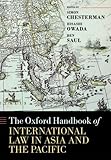The Oxford handbook of international law in Asia and the Pacific / edited by Simon Chesterman, Hisashi Owada and Ben Saul.
Series: Oxford handbooksPublication details: Oxford, United Kingdom ; New York, NY : Oxford University Press, c2019.Edition: First editionDescription: xlvii, 855 pages ; 26 cmISBN:- 9780198793854
- 0198793855
- International law in Asia and the Pacific
- 341.095 23
- KZ4730 .O95 2019
| Item type | Current library | Home library | Call number | Copy number | Status | Date due | Barcode | Item holds |
|---|---|---|---|---|---|---|---|---|
 Book
Book
|
Ayesha Abed Library General Stacks | Ayesha Abed Library General Stacks | 341.095 OXF (Browse shelf(Opens below)) | 1 | Available | 3010037538 | ||
 Book
Book
|
Ayesha Abed Library General Stacks | Ayesha Abed Library General Stacks | 341.095 OXF (Browse shelf(Opens below)) | 2 | Available | 3010037539 |
Browsing Ayesha Abed Library shelves, Shelving location: General Stacks Close shelf browser (Hides shelf browser)

|

|

|

|

|

|

|
||
| 341.072 GUI Guide to foreign and international legal citations. | 341.076 VER The public international law study guide for students : | 341.095 OXF The Oxford handbook of international law in Asia and the Pacific / | 341.095 OXF The Oxford handbook of international law in Asia and the Pacific / | 341.2 ACH Constructing global order : | 341.2 POL The politics of global governance : | 341.23 URQ A world in need of leadership : |
Includes bibliographical references and index.
Asia's ambivalence on international law / Simon Chesterman -- Regional organizations / Tan Hsien-Li -- History and theory of international law / Tony Anghie -- Regional peace and security / WPS Sidhu -- Human rights / Hurst Hannum -- International humanitarian law and international criminal law / Suzannah Linton -- International environmental law / Ben Boer -- Law of the sea / Robert C. Beckman -- International economic law / Wang Jiangyu -- Dispute settlement / Hisashi Owada -- China / Li Zhaojie -- Japan / Toshiki Mogami -- South Korea / Seokwoo Lee and Hee Eun Lee -- Thailand / Vitit Muntabhorn -- Indonesia / Hikmahanto Juwana -- The Philippines / Romel Bagares -- Singapore / Li-ann Thio and Kevin YL Tan -- Malaysia / Abdul Ghafur Hamid, Khin Maung Sein -- Vietnam / Trinh Hai Yen -- Cambodia / Mahdev Mohan -- Myanmar / Catherine Renshaw -- India / BS Chimn -- Pakistan / Ahmer Bilal Soofi -- Bangladesh / Kamal Hossain and Sharif Bhuiyan -- Nepal / Pratyush Nath Upreti and Surya Subedi -- Sri Lanka / Rohan Perera -- Central Asian States / Marina Girshovich -- Afghanistan / Veronica Taylor -- Australia / Ben Saul -- New Zealand / Kenneth Keith -- Pacific Island States / Jennifer Corrin.
The growing economic and political significance of Asia has exposed a tension in the modern international order. Despite growing in power and influence, Asian states traditionally played a minimal role in creating the norms and institutions of international law. They were the least likely to be parties to international agreements or be represented in international organizations. That is changing. Today, there is widespread scholarly and practitioner interest in international law in the Asia-Pacific region, as well as developments in the practice of states. The change has been driven by threats as well as opportunities. On the threat side are transnational challenges such as climate change, in which the involvement of Asian states is essential, and occasional flashpoints such as the territorial disputes of the South China and the East China Seas. In terms of opportunities, economic integration and the proliferation of dispute settlement mechanisms have encouraged greater domestic implementation of international norms across Asia. These evolutions join a more long-standing interest in parts of Asia (notably South Asia) in post-colonial theory and the history of international law. This Oxford Handbook brings together pre-eminent and emerging specialists to analyse the approach and influence of key states in the region. It also explores whether truly 'Asian' trends can be identified and what this might mean for the international order.
SOL


There are no comments on this title.